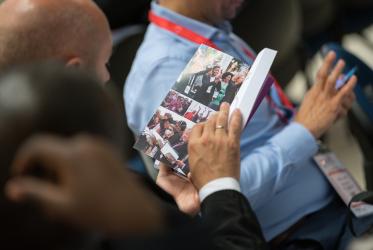Dear brothers and sisters in Christ:
“The grace of the Lord Jesus Christ, the love of God, and the communion of the Holy Spirit be with all of you” (2 Cor 13:13).
I would like to cordially greet the representatives of the Christian communions gathered in Karlsruhe, on the occasion of the 11th Assembly of the World Council of Churches. I assure you of my pastoral interest in the work of the Assembly. I wish you a meaningful and fruitful meeting that deepens and strengthens the bonds of communion between the Churches and the ecumenical organisations present. The Catholic Church has been sending “delegated observers” to the Assemblies since the Third Assembly took place in New Delhi, in 1901; I am glad that a delegation is also present this year, a sign of the strong relationship between the Catholic Church and the World Council of Churches that has consolidated over time.
This Assembly convenes under the theme “Christ’s love moves the world to reconciliation and unity”. Our world remains plagued by discord, conflict, and division. Wars, discrimination, different forms of injustice and division persist, even among Christians themselves. The globalised world in which we live demands of us a common witness to the Gospel, in response to the pressing needs of our time. The theme of the Assembly is a timely invitation to the world communion of Christians to work together for greater closeness and unity among Churches, religions, cultures, peoples, nations, and the entire human family, and to foster reconciliation across the world.
As we commit to a greater effort to care for those who need it most, to work for justice and peace, and to promote human development, let us do so moved by the Gospel. The search for reconciliation and unity has, above all, a vertical dimension, as it is directed towards He who, as Redeemer of the world and Lord of history, is Himself our reconciliation. In fact, “God has reconciled us to himself through Christ” (cf. 2 Cor 5:18).
Our mission as Christians is to bring the fulfilment of this reconciliation to the world, with the Church being the instrument and visible sign of the unity to which God calls all people. Only Christians fully committed to the service of the human family and zealous to make disciples of all nations – baptising them in the name of the Father, and of the Son, and of the Holy Spirit, and teaching them to observe all that the Lord has commanded them (cf. Mt 28:19) – can attract people. Faced with the perennial temptation to accommodate the evangelical message to worldly ways of thinking, we must constantly remember that we are only convincing when we are faithful to the Lord, who said of himself: “I am the way and the truth and the life. No one comes to the Father except through me” (Jn 14:6). The Christian community does not grow by proselytism, but only by attraction.
But how can we credibly proclaim the Gospel of reconciliation without also being committed, as Christians, to promoting reconciliation among ourselves? I ask God that this Assembly strengthen everyone’s commitment towards a more intense cooperation in the search of a fuller and more visible communion. Reconciliation among Christians is the fundamental prerequisite for the credible mission of the Church. Ecumenism and Mission belong together and interrelate.
This Assembly is already emblematic for its reconciled diversity. May it strengthen and deepen communion among all, so that Christian unity may be an ever more radiant sign of hope and comfort for humanity. Conscious that the soul of ecumenism remains authentic conversion, holiness and prayer (cf. Unitatis Redintegratio, 8), I pray that the Assembly may bring the world closer to reconciliation and unity, with the power and light of the Holy Spirit.
Rome, Saint John Lateran, 15 August 2022





